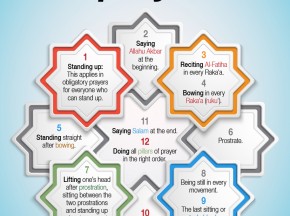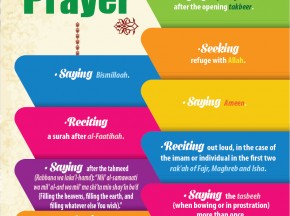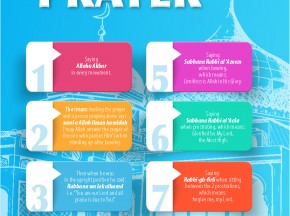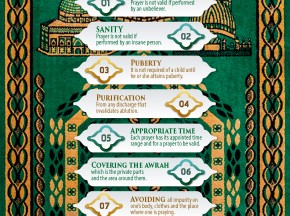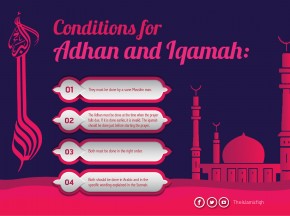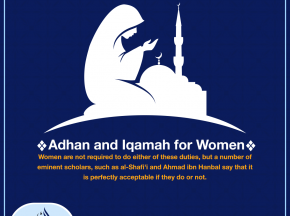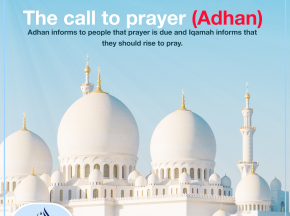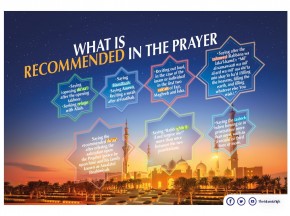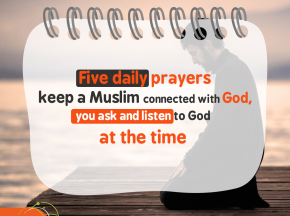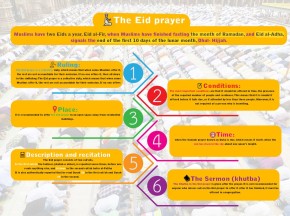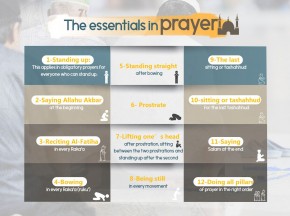content of level
The congregational prayer
In this Lecture, Sh. Assim Al-Hakeem discusses and explains The congregational prayer.
Fiqh of Adhan and Iqama
In this Lecture, Sh. Assim Al-Hakeem discusses and explains Fiqh of Adhan and Iqama. This course will cover all the practical rules that every Muslim, man or woman, should know, citing their bases in the Qur’an and the Sunnah.
What do followers say behind the imam?
What do followers say behind the imam? Allahu Akbar, Sami Allah huliman hamida etc - Assim al hakeem.
How to pray Eid Prayer, Is it mandatory?
How to pray Eid Prayer, Is it mandatory, Where to pray it, Must travelers pray Eid Prayer- Assim Alhakeem
Does Laughing or Smiling nullify your Prayer?
Does Laughing or Smiling nullify your Prayer? - Assim al hakeem.
shortening the prayer
A revert sister asks about shortening the prayer.
The Prophet's Prayer from Authentic Ahadith
The Prophet's Prayer from Authentic Ahadith.
The essentials in prayer
1-Standing up: This applies in obligatory prayers for everyone who can stand up. 2-Saying Allahu Akbar at the beginning . 3-Reciting Al-Fatiha in every Raka'a. 4-Bowing in every Raka'a (ruku'). 5-Standing straight after bowing. 6-Prostrate. 7-Lifting one’s head after prostration, sitting between the two prostrations and standing up after the second. 8-Being still in every movement. 9-The last sitting or tashahhud. 10-Sitting down for the last tashahhud. 11-Saying Salam at the end. 12-Doing all pillars of prayer in the right order.
What is recommended in prayer
· Saying (opening du’aa’) after the opening takbeer. · Seeking refuge with Allah. · Saying Bismillaah. · Saying Ameen. · Reciting a surah after al-Faatihah. · Reciting out loud, in the case of the imam or individual in the first two rak'ah of Fajr, Maghreb and Isha. ·Saying after the tahmeed (Rabbana wa laka’l-hamd): “Mil’ al-samawaati wa mil’ al-ard wa mil’ ma shi’ta min shay’in ba’d (Filling the heavens, filling the earth, and filling whatever else You wish).” ·Saying the tasbeeh (when bowing or in prostration) more than once, such as a second or third time or more. · Saying “Rabb ighfir li (Lord forgive me)” more than once between the two prostrations. ·Saying the recommended du’aa’ after offering the salutation upon the Prophet (peace be upon him) and his family known as Assalatul Ibrahimiyah.
Duties in prayer
1-Saying Allahu Akbar in every movement. 2-The imam leading the prayer and a person praying alone says: sami a Allah liman hamidah (‘may Allah answer the prayer of the one who praises Him’) when standing up after bowing 3-Then when he was in the upright position he said: Rabbana wa lak alh md i.e. “You are our Lord and all praise is due to You”’. 4-Every worshipper in the congregation says only Rabbana wa lak alhamd, while al imam says it immediately after sami Allah liman hamidah. 5-Saying Subhana Rabbi al 'Azeem when bowing, which means: Limitless is Allah in His Glory 6-Saying Subhana Rabbi al 'Aala when prostrating, which means: Glorified be My Lord, the Most High. 7-Saying: Rabbi-gh-firli when sitting between the 2 prostrations, which means: forgive me, my Lord. 8-The first tashahhud, except for people in the congregation when the imam forgets this tashahhud and rises for the next rakah. Those in the congregation are exempt from it because they have an overriding obligation to follow the imam.
Conditions for the validity of prayer
1-Islam: Prayer is not valid if performed by an unbeliever. 2-Sanity: Prayer is not valid if performed by an insane person. 3-Puberty: It is not required of a child until he or she attains puberty. 4-Purification: From any discharge that invalidates ablution. 5-Appropriate time: Each prayer has its appointed time range and for a prayer to be valid. 6-Covering the awrah, which is the private parts and the area around them. 7-Avoiding all impurity on one’s body, clothes and the place where one is praying. 8-Facing the qiblah (i.e. the direction towards the Ka bah) when one is able to do so. 9-Intention: The intention is a mental process and need not be vocalized.
Conditions for Adhan and Iqamah
1- They must be done by a sane Muslim man. 2- The Adhan must be done at the time when the prayer falls due. If it is done earlier, it is invalid. The iqamah should be done just before starting the prayer, 3- Both must be done in the right order. 4- Both should be done in Arabic and in the specific wording explained in the Sunnah.
Adhan and Iqamah for Women
Women are not required to do either of these duties, but a number of eminent scholars, such as al-Shafi'i and Ahmad ibn Hanbal say that it is perfectly acceptable if they do or not.
The call to prayer (Adhan)
Adhan informs to people that prayer is due and Iqamah informs that they should rise to pray.
What is recommended in Friday Prayer
It is recommended, i.e. a Sunnah, to go to the mosque early to earn great reward.
What is recommended in the prayer
What is recommended in the prayer • Saying (opening du’aa’) after the opening takbeer. • Seeking refuge with Allah. • Saying Bismillaah. • Saying Ameen. • Reciting a surah after al-Faatihah. • Reciting out loud, in the case of the imam or individual in the first two rak'ah of Fajr, Maghreb and Isha. •Saying after the tahmeed (Rabbana wa laka’l-hamd): “Mil’ al-samawaati wa mil’ al-ard wa mil’ ma shi’ta min shay’in ba’d (Filling the heavens, filling the earth, and filling whatever else You wish).” •Saying the tasbeeh (when bowing or in prostration) more than once, such as a second or third time or more. • Saying “Rabb ighfir li (Lord forgive me)” more than once between the two prostrations. •Saying the recommended du’aa’ after offering the salutation upon the Prophet (peace be upon him) and his family known as Assalatul Ibrahimiyah.
The Prayer of Eclipse
Praying it is a communal obligation and it must be prayed in congregation and in the masjid. When the eclipse is visible and can be seen by people, the call is made to gather the Muslims in the mosque.
The Five daily prayers
Five daily prayers keep a Muslim connected with God, you ask and listen to God at the same time.
The Eid Prayer
Muslims celebrate two Eids a year. They start their Eid by performing a prayer that is one of the most favorite acts to them and they consist of two rakaa and a speech that reminds them of the Islamic ethics.
The essentials of prayers
Prayer has some essentials, i.e. rukn, and these cannot be omitted intentionally, unintentionally or out of ignorance. They are:








